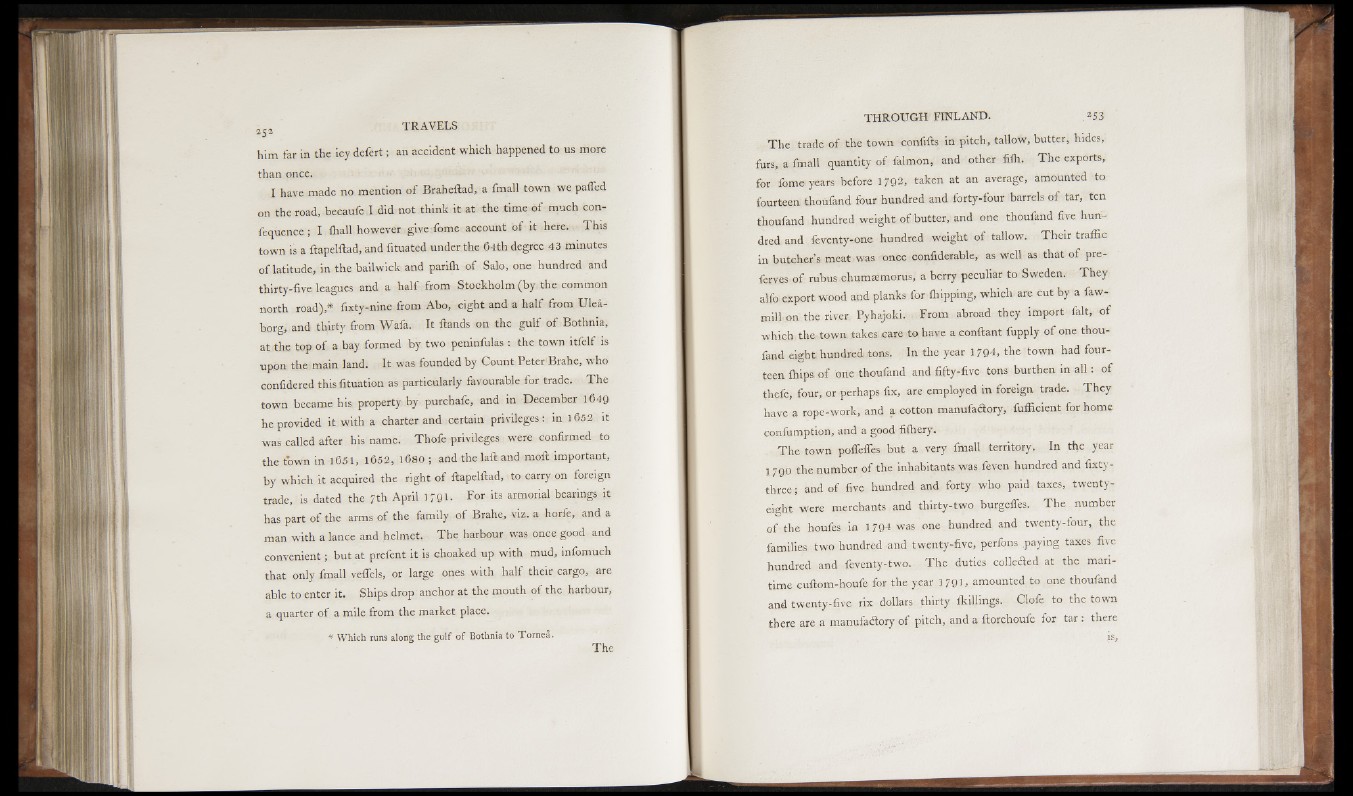
him far in the icy d efert; an accident which happened to us more
than once.
I have made no mention o f Braheftad, a fmall town we palfed
on the road, becaufe I did not think it at the time o f much eon-
fequence ; I lhall however give Tome account o f it here. This
town is a ftapelftad, and fituated under the 04th degree 43 minutes
o f latitude, in the bailwick and pariih o f Salo, one hundred and
thirty-five leagues and a half from Stockholm (by the common
north road),* fixty-nine from Abo, eight and a half from Ulea-
borg, and thirty from Wafa. It Hands on the gulf o f Bothnia,
at the top of a bay formed by two peninfulas : the town ltfelf is
upon the main land. It was founded by Count Peter Brahe, who
confidered this fituatlon as particularly favourable for trade. The
town became his property by purchafe, and in December 1649
he provided it with a charter and certain p r iv ile g e s in 1652 it
was called after his name. Thofe privileges were confirmed to
the town in 1651, 1652, 1680 ; and the laft and moll; important,
by which it acquired the right o f ftapelftad, - to carry on foreign
trade, is dated the 7th April 1701- For its armorial bearings it
has part o f the arms o f the family o f Brahe, viz. a horfe, and a
man with a lance and helmet. The harbour was once good and
convenient; but at prefent it is choaked up with mud, infomuch
that only fmall veffels, or large ones with half their cargo, are
able to enter it. Ships drop anchor at the mouth of the harbour,
a quarter o f a mile from the market place.
* Which runs along the gulf of Bothnia to Tornea.
The
T h e trade o f the town confifts in pitch, tallow, butter, hides,
furs, a fmall quantity o f falmon, and other fifh. T he exports,
for fome. years before 1 7Q2 , taken at an average, amounted to
fourteen thoufand four hundred and forty-four barrels ó f tar, ten
thoufand h u n d r e d weight o f butter, and one thoufand five hundred
and feventy-one hundred weight o f tallow. Their traffic
in butcher’s meat was once confiderable, as well as that o f pre-
ferves o f rubus chumaemorus, a berry peculiar to Sweden. They
alfo export wood and planks for ihipping, which are cut by a faw-
mill on the river Pyhajoki. From abroad they import fait, o f
which the, town takes, care to have a conftant fupply o f one thoufand
eight hundred tons. In the year 1794, the town had fourteen
ihips o f one thoufand and fifty-five tons burthen in all : o f
thefe, four, or perhaps fix, are employed in foreign trade. They
have a rope-work, and a cotton manufaéìory, fufficient for home
confumption, and a good fiihery.
T he town poflèflès but a.very fmall territory. In the year
1790 thè number of the inhabitants was feven hundred and fixty-
three ; and o f five hundred and forty who paid taxes, twenty-
eight were merchants and thirty-two burgelfes. T h e number
o f the houfes in 1 79 4 was one hundred and twenty-four, the
families two hundred and twenty-five, perfons paying taxes five
hundred and feventy-two. T h e duties collected at the maritime
cuftom-houfe for the year 1 7 9 1 , amounted to one thoufand
and twenty-five rix dollars thirty {killings. Clofe to the town
there are a manufactory o f pitch, and a ftorehoufe for tar : there
is,